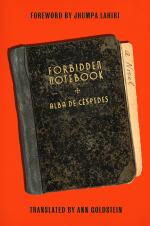|
This section contains 583 words (approx. 2 pages at 400 words per page) |

|
Forbidden Notebook Summary & Study Guide Description
Forbidden Notebook Summary & Study Guide includes comprehensive information and analysis to help you understand the book. This study guide contains the following sections:
This detailed literature summary also contains Quotes and a Free Quiz on Forbidden Notebook by Alba de Céspedes.
The following version of this book was used to create the guide: De Céspedes, Alba. Forbidden Notebook. Astra House, 2023.
Alba De Céspedes first person narrative, Forbidden Notebook follows the life of Valeria Cossati after she secretly purchases a notebook and begins writing about her life. At the outset of the novel, the narrator is not sure what she intends to write because she sees her life as insignificant and banal. However, as she records her thoughts, emotions, and desires within the white pages she realizes that every interaction is more meaningful than she previously thought. Valeria stays up late to write and hides the notebook, afraid that her husband or children will discover her secret and take it from her. In her journal entries, the narrator speaks openly about her frustrations with Mirella, she is concerned that her daughter will ruin herself by having an affair with a married man. She continually tells her daughter that she should feel ashamed and humiliated by her own actions. Despite her outward derision of Mirella, Valeria confesses to her notebook that she is unsatisfied in her life and uncertain how her thoughts and emotions can coexist with the patriarchal expectations that define her life.
As the narrative progresses, Valeria searches for more time to write and goes to the office on Saturday to be alone. While she is contemplating the shifts in her relationship with Michele, the director enters. She makes a limp excise to explain her presence, but he is not irked and confides that he uses the office to escape from his domestic life. Over the next months, Valeria visits the office every Saturday to spend time with her boss. While he had previously seemed like another male authoritarian figure in her life, for the first time she thinks of him as Guido. He is the only person who calls her Valeria and the intimacy and respect in this address makes her feel seen. At home, even her husband refers to her as mamma.
Later, when Valeria discovers that Cantoni is married, she rebukes her daughter again for behaving without morality. Mirella insists that she has nothing to be ashamed of. Her actions are well intentioned, and she is not humiliating herself by having a relationship or career. Riccardo also decries his sister’s behavior and insists that women only care about money; women who work selfishly take employment away from men. He plans to leave for Buenos Aires but is unsure how he will be able to support a family. Valeria encourages him to wait to marry Marina, but he announces that their marriage must be moved forward. Marina is pregnant and while he contemplated leaving her he will uphold his duty. He insists that they will move in with his parents. Valeria is dismayed by her son’s behavior and the implication it will have on her own life. The trip she planned with Guido, to visit Venice, is no longer viable because she must be present to help her son and husband when the marriage occurs. While Valeria has questioned her daughter throughout the narrative, at this moment, she recognizes that Mirella can free herself from the cycle of domestic labor, erasure, and complacency that dictated her own life. Toward the close of the narrative, Valeria resolves to burn her notebook. She is afraid that her writing will be discovered by Marina and does not want the younger woman to have evidence to shame her.
Read more from the Study Guide
|
This section contains 583 words (approx. 2 pages at 400 words per page) |

|



